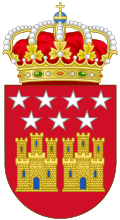President of Madrid
| President of the Community of Madrid Presidente de la Comunidad de Madrid |
|
|---|---|

Coat of arms of the Community of Madrid
|
|
| Style | Excelentisimo/a señor/a (The Most Excellent) |
| Nominator | Madrid Assembly |
| Term length | Four years |
| Inaugural holder | Joaquín Leguina |
| Formation | 1983 |
| Website | www.madrid.org |
The President of the Community of Madrid is the highest-ranking officer of the Autonomous Community of Madrid and the head of the Executive Branch. The office is currently held by Cristina Cifuentes of the People's Party.
In the process of the democracy restoration in Spain between 1975–1978, the nationalist and regionalist parties pressed to grant home rule to parts of Spain. Finally, the Constitution stated that any province or group of provinces could form an autonomous community and thus be granted partial home rule. The Autonomous Community of Madrid (Spanish Comunidad Autónoma de Madrid) was created in 1982, and since then regional elections are held every 4 years.
Unlike those of the US states, the citizens of the Autonomous Communities of Spain don't elect a person for presidency of their community: they elect the regional legislature, and that legislature elects the regional President. This system usually assures the government more stability because a candidate needs a majority (that is supposed to be loyal to him/her during the whole term) to be elected, but has a significant drawback: a party can win the election (be the top-voted party) and still be denied the right to form the government (have a majority). This situation, though infrequent in nationwide elections, often happens in local/regional legislatures throughout Spain: the most usual coalition is between the Socialist Party (PSOE) and the United Left (IU).
In Madrid, such a coalition was formed in the 2nd term, in which the incumbent Socialist Joaquín Leguina won the election without a majority, once more in the 3rd term, allowing him to remain in office even after having lost the election to the People's Party (PP), and once more in the 6th term, by the PSOE candidate Rafael Simancas. However, this last coalition ultimately failed due to the dissidence of two PSOE Assembly Members, which denounced the pact with IU as being too wide and unrepresentative of the people's will due to the planned power balance. Elections were repeated after a few weeks and Partido Popular won, then by absolute majority.
...
Wikipedia

